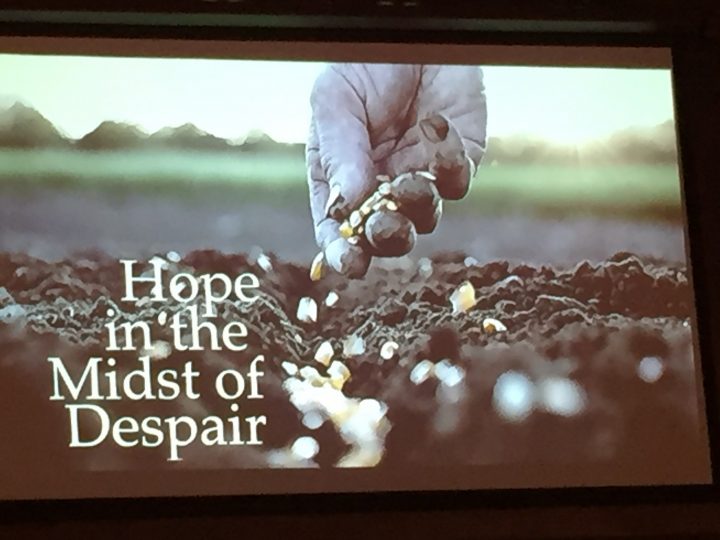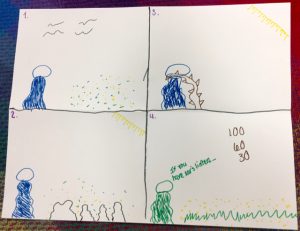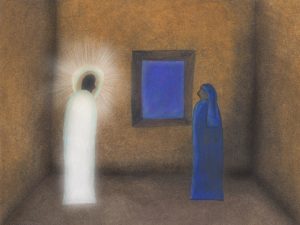
Sermon graphic by Randy Palmer for Grace UMC
“Let us not grow weary”
Tom preached on the parable of the sower from Matthew 13 in early November. I told the story including Jesus’ interpretation. I also told and taught the parable at our county jail on Wednesday. It’s a powerful teaching about the kingdom of God.
As an intro to his sermon, Tom played the first verse of “Do your ears hang low” from the Go Fish “Party Like a Preschooler” album. It was fun and eased the tension of this post-election Sunday. There was a point, though: pay attention to your ears; pay attention to what you hear about the kingdom of God from Jesus.
Things got serious as Tom talked about Jesus’ teaching on the kingdom of God. He named three key aspects of the kingdom of God according to Jesus’ words and actions:
- Health care for all, within the Law or not, deserving or not;
- Inclusivity, for ALL are welcome in the kingdom of God;
- Non-violence, as in “Love your enemies and pray for those who persecute you.”
Tom also mentioned two things Jesus never talked about: abortion and homosexuality. Funny that those two things are litmus tests of morality for so many contemporary Christians, while universal health care, inclusivity, and non-violence are rarely mentioned. Sometimes I wonder if Christians really read the Gospels. If so, do they have ears to hear?

Storyboard for Parable of the Sower
The sermon was titled “Hope in the Midst of Despair.” There were seeds that got eaten, seedlings that got scorched and withered, and plants that were choked before they could produce, but some of those seeds scattered by the sower produced over-the-top abundantly.
The implication of Jesus’ parable on the sower is well stated in Galatians 6:9. Tom concluded, “As one prominent Methodist woman said on Wednesday, quoting Paul, ‘Let us not grow weary of doing what is right, for we will reap at harvest time if we do not give up.’”
We might also say, “Let us not grow weary of telling the stories of God, for we will reap at harvest time if we do not give up.”
Click here to download the sermon

“Greetings, Mary” by Cortney L. Haley
Prince of Peace… Really?
During Advent we anticipate and prepare for the coming of the Messiah. We remember the longing of God’s people for a Messiah to save them from domination and oppression. Isaiah prophesied about a Messiah who would be called the Prince of Peace. The gospels claim that Mary gave birth to him in Bethlehem.
Tom Boomershine wrote a book entitled The Messiah of Peace (Wipf & Stock, 2015). It’s a performance criticism commentary on the passion, death, and resurrection of Jesus according to Mark. But what sense does it make to call Jesus the Messiah of Peace, when there is so little peace in the world?
According to Tom, the implication of Mark’s gospel story is that Jesus made clear the way to world peace in his practice of non-violence and his acts of love for enemies. Yet people, including most Christians throughout history, have not followed his way. As experienced in the responses of his followers in the passion narrative, the way of Jesus is hard. Most people continue to love war stories and to believe that victory in war over our enemies is the way to bring peace to the world.
Mark’s good news is that God has revealed the way to peace and victory over the powers of evil in Jesus’ ministry, death, and resurrection. It all began in a manger, where Mary laid her baby. We will celebrate that humble beginning again this month.
Purchase a copy of The Messiah of Peace from GoTell for $40 plus shipping. Email Amelia at info@gotell.org

Starlight Escape: Storykeepers for Christmas
“Starlight Escape” is an exciting episode from The Storykeepers available at GoTell. It relates the birth narratives from both Luke and Matthew in a compelling way for children. This episode tells the Christmas stories of the baby Jesus—born to be a refugee and the Prince of Peace, visited by magi as well as lowly shepherds, narrowly escaping the persecution of King Herod.
“Starlight Escape” is about journeys and miracles. Stories about the journey of Mary and Joseph to Bethlehem and the miracle of the birth of Jesus unfold during the journey the Storykeepers make to tell the gospel story beyond Rome. Ben, Helena, and their family of orphans continue their storykeeping mission even as they flee from Roman soldiers.
“Starlight Escape” is episode 6 of The Storykeepers. To purchase a set of 13 half-hour episodes on 4 DVDs for $80 plus shipping, email amelia at info@gotell.org. It would make a great Christmas gift for your favorite children.

Antti Kalevi
Look Sleep Wake Up Wow
2015 Lettering, Finland
Improve Your Storytelling: Exaggerate
Richard F. Ward, PhD
Once I have the words internalized (mostly) I like to exaggerate attitude, emotion, and gesture—in short, play with it by creating caricatured interpretations of the characters. It helps me find the range I am looking for while getting some of the nerves out. It reminds me (as Tom Driver says) that it is “work done playfully” and therefore establishes kinship with ritual behavior. Then it is time to focus on intention and start establishing a relationship with my imagined audience. At that point I like to find the blocking that helps me not only remember, but shapes the images I want to leave in the auditors mind’s eye.
This tip for improving your storytelling is reprinted with permission from “Scholarly Musings” published online by the Network of Biblical Storytellers. This month’s tip comes to you from Richard Ward—biblical storyteller, Professor of Homiletics & Worship at Phillips Seminary, and ordained minister in the United Church of Christ.


